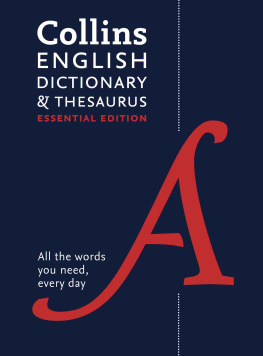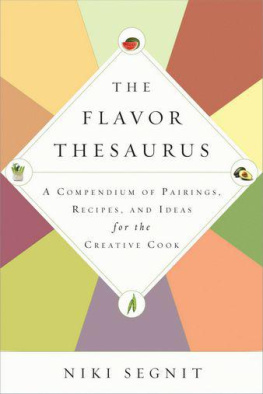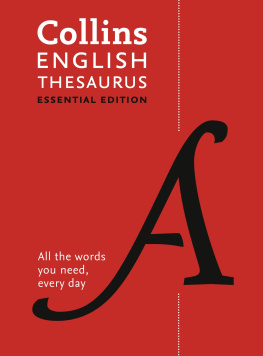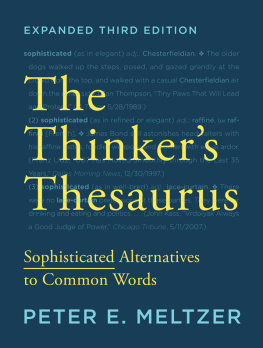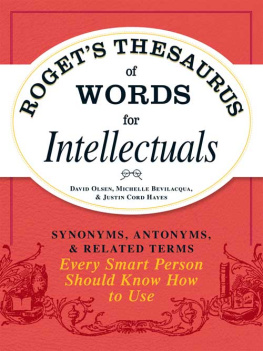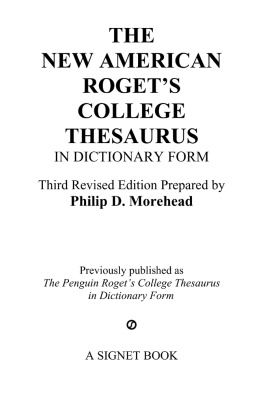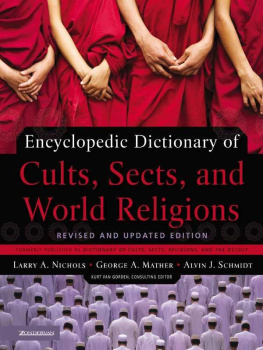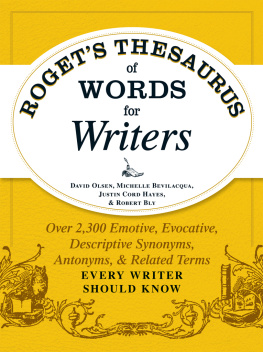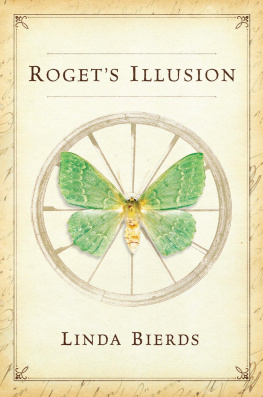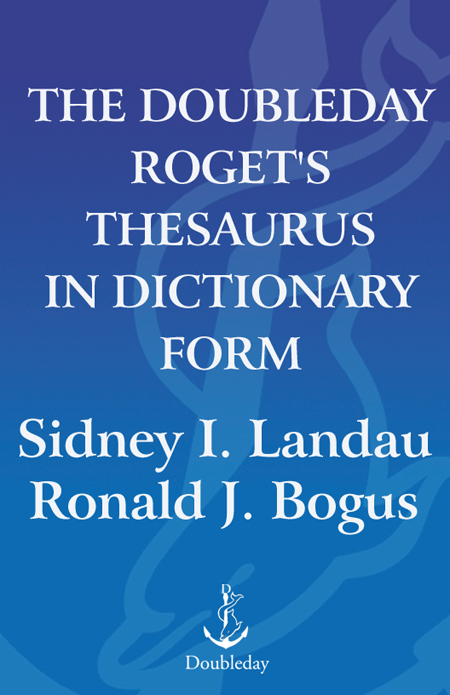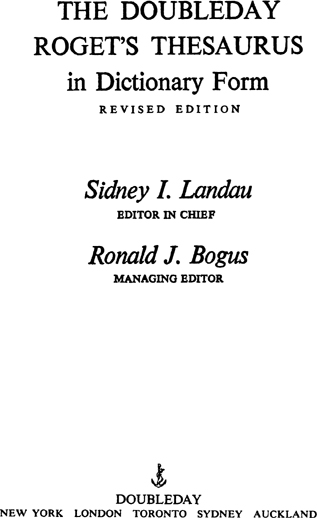Preface
American thesauruses generally fall into two categories: the voluminous, subject-indexed variety and the brief, alphabetically arranged dictionary-style book. Many people find the subject-index thesaurus difficult to use because the breakdown of senses is overrefined and overlapping. One must often turn to two or three places to find synonyms for any one sense, and even so one frequently finds few apt synonyms and much redundancy, as well as a hodge-podge of antiquated clichos, phrases that are really brief definitions rather than synonyms, and words so artificially composed of Latin or Greek elements that it would be safe to say they have appeared nowhere else other than in thesauruses. On the other hand, the shorter, alphabetical thesauruses often give too few synonyms to be helpful. One is trapped between the Scylla of parsimony and the Charybdis of overabundance.
We hope to avoid this quandary by having a simple format with a comparatively full, but nevertheless selective, treatment of synonyms. The Doubleday Rogefs Thesaurus is arranged in one alphabetical listing so that at the first reference one can find a sufficient number of apt synonyms for the term one is looking up. Synonyms for all the important meanings of the term can be found at the same place, without having to turn to a different section for each meaning.
As has been often observed, there are very few exact synonyms in English. To state the point more explicitly: very few words can be freely substituted for another word in a variety of contexts without changing the sense or making the statement unidiomatic or nonsensical. Any thesaurus that attempted to list only exact synonyms would be very short indeed, and not very useful; for one of the chief reasons for using a thesaurus is precisely to find words that are identical to the entry word in some contexts but not in others, or that differ in connotation or usage level, i.e., in the degree of formality or informality. The question is how far afield from the central core of meaning do we stray?
Our aim has been to provide the reader with words that closely reflect the particular meaning of the entry wordwords that one can imagine being substituted for it in a fairly broad variety of contexts. Given this desired correspondence of meaning, we have tried to provide the reader with as wide a choice as possible. As a practical matter, we have usually limited the number of synonyms listed under any one meaning to twenty or fewer; to go much beyond this number would be likely to bury the reader in a plethora of words, many of them irrelevant. The essential criterion was always aptness; if the synonyms were apt, we would bend the rule to include as many as possible.
As a matter of policy, this thesaurus does not list types of things as synonyms. We do not, under disease, list kinds of diseases, nor under doctor do we list various specialties of medicine. Such lists are arbitrary how many of the thousands of well-known kinds of insects should one list under insect?and therefore too selective to be of any use; and they are not composed of synonyms. The alert reader will detect occasional contraventions of this policy, to which we freely admit; when we felt it was useful and not arbitrary to include terms of this kind, we have done so. The distinction between synonyms and words belonging to a sub-category is not always clear-cut, and in such cases we have tended to include these terms.
Very few thesauruses pay much attention to antonyms. We have paid a great deal of attention to them, believing that many readers find them useful in sharpening their appreciation of the range of meanings of the synonyms to which they apply. Although we have sought to avoid imposing antonyms on words which have no antonyms, we have even so found it necessary to be somewhat more flexible in selecting antonyms than in selecting synonyms. If there are few exact synonyms, there are even fewer exact antonyms. Antonyms have a way of meandering away from the basic meaning, so that the last word of a list of antonyms may have very little in common with the first. Yet at no point in the process is one aware of having made any quantum jumps in meaning. As with synonyms, so, more emphatically, with antonyms: too exacting a standard would rule out all but a few words, and the result would be a book of much diminished value.
SIDNEY I. LANDAU
Editor-in-Chief
Guide to the Use of This Thesaurus
Entry terms are arranged in a single alphabetical list and appear in large, bold type. Alphabetization is letter by letter, as in most dictionaries, rather than word by word. For example, pitcher precedes pitch in. Homographs such as pit1 (cavity, hole) and pit2 (stone, kernel) are entered separately and distinguished by superscript numbers.
The part-of-speech label follows the entry word. Part-of-speech labels are abbreviated as follows: n., noun; v., verb; adj., adjective; adv., adverb; pron., pronoun; prep., preposition. Phrases of two or more words are not labeled. If an entry has more than one part of speeche.g., run is both a verb and a nounsuccessive parts of speech are introduced by a boldfaced dash. Different meanings under each part of speech are distinguished by numerals in bold type. To aid the reader in perceiving differences in meaning, the first few synonyms listed under each meaning are those that best distinguish it from other meanings. Within this limitation, synonyms are listed with commoner words first, followed by more specialized and less familiar terms. Occasionally, a brief definition or contextual reference is necessary to distinguish between different meanings, as in the case of clever:
cleveradj.physically skillful: adroit, skillful, dexterous, nimble bright, keen, sharp, quick, ingenious, original, inventive
Special attention has been given to slang words and terms, which are always labeled in this work. Slang synonyms are identified by the label (Slang) in parentheses. Slang entries are identified by the label Slang without parentheses. Terms that are chiefly British are labeled (Brit.). Words that are usually considered foreign are printed in italic type. It should be noted that many terms not labeled may be considered colloquial or informal in certain senses and contexts; but since a thesaurus must necessarily combine meanings that in a dictionary would be distinguished, it is not practicable to restrict the application of such terms.
Antonyms, keyed where appropriate to particular meanings, are listed following the synonym treatment, introduced by the abbreviation ant. In some cases, no antonyms are applicable.
Synonyms printed in small capital letters are cross-references. Thus:
plain-spokenadj. FRANK.
directs the reader to the entry frank, where a full list of synonyms that might be used for plain-spoken is to be found.
A
abandon v. desert, forsake, leave, quit, discontinue, desolate, drop, repudiate, reject, renounce, defect, jilt, be done with, be through with. n. wantonness, unrestraint, wildness, imprudence, profligacy, libertinism, intemperance, self-indulgence, mind-lessness, heedlessness, hedonism, abandonment.


